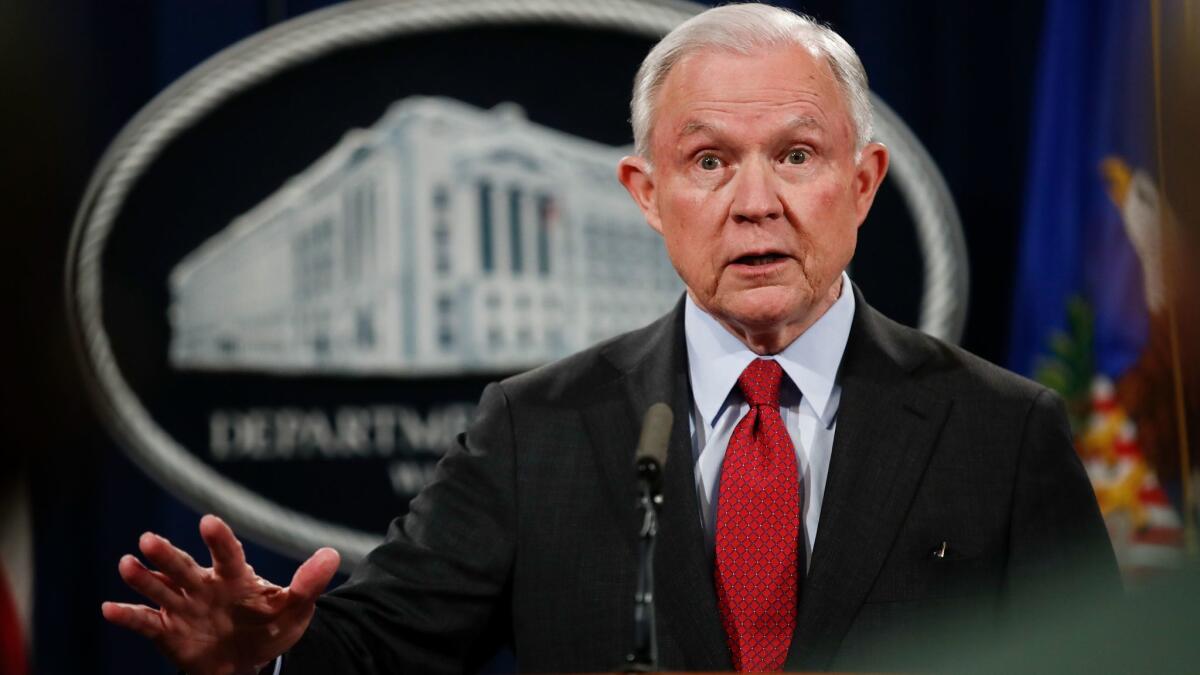Sessions takes aim at judges’ handling of immigration cases

- Share via
Reporting from San Diego — Atty. Gen. Jeff Sessions on Friday launched a review of a little-known but widely used practice of immigration judges closing cases without decisions, potentially putting hundreds of thousands of people in greater legal limbo.
Sessions posed detailed questions challenging the use of “administrative closures,” an increasingly common outcome that allows people to stay in the country without legal status. The attorney general invited feedback from advocates and others, after which time he may issue new instructions for immigration judges nationwide.
Administrative closures have been a lifeline to immigrants who apply for citizenship, permanent residency or other visas, shielding them from deportation while their petitions are vetted. But critics say judges too often let people stay in the country longer than they should in a sort of legal purgatory.
About 350,000 cases are administratively closed, and the Justice Department said 180,000 cases were closed in four years of the Obama administration, more than in the previous 22 years. In 2012, the department’s Board of Immigration Appeals ruled that neither Homeland Security Department attorneys seeking to deport someone nor the immigrant trying to stay could stop a judge from closing a case, paving the way for the increase.
Immigration judges are employees of the Justice Department’s Executive Office for Immigration Review, giving the attorney general broad oversight powers even as they assert independence. Sessions, a former U.S. senator from Alabama and immigration hardliner, signaled last month that he planned to be heavily involved in setting policies aimed at reducing a court backlog of 650,000 cases and deciding cases more quickly, and Friday’s announcement was a step in that direction.
Sessions intervened Friday in the case of Reynaldo Castro-Tum, who came to the country as a child in 2014 from Guatemala, to launch a review that may affect every judge. He asked what authority judges have to issue administrative closures and under what criteria, whether he should revoke that authority and whether there is another mechanism to address legitimate concerns. He also questioned whether judges should revisit the 350,000 cases currently closed if he decides the practice is unwarranted.
The attorney general asked Homeland Security, Castro-Tum and outside parties to submit written responses by Feb. 9.
The National Assn. of Immigration Judges is considering a response but is wary of “potential interference with independent judicial decision-making” and limits on how judges manage their dockets, said Dana Leigh Marks, an immigration judge and spokeswoman for the group.
“It’s like asking judges to handle their overwhelming dockets and then tying their hands behind their backs,” she said.
Reopening up to 350,000 cases may substantially increase the backlog, but supporters of Sessions’ move said it was overdue. Andrew Arthur, a retired immigration judge, said the practice had become “a backdoor amnesty.”
“As a practical matter, it just kind of swept those cases under the rug,” said Arthur, now a fellow at Center for Immigration Studies, which advocates for immigration restrictions.
More to Read
Sign up for Essential California
The most important California stories and recommendations in your inbox every morning.
You may occasionally receive promotional content from the Los Angeles Times.













